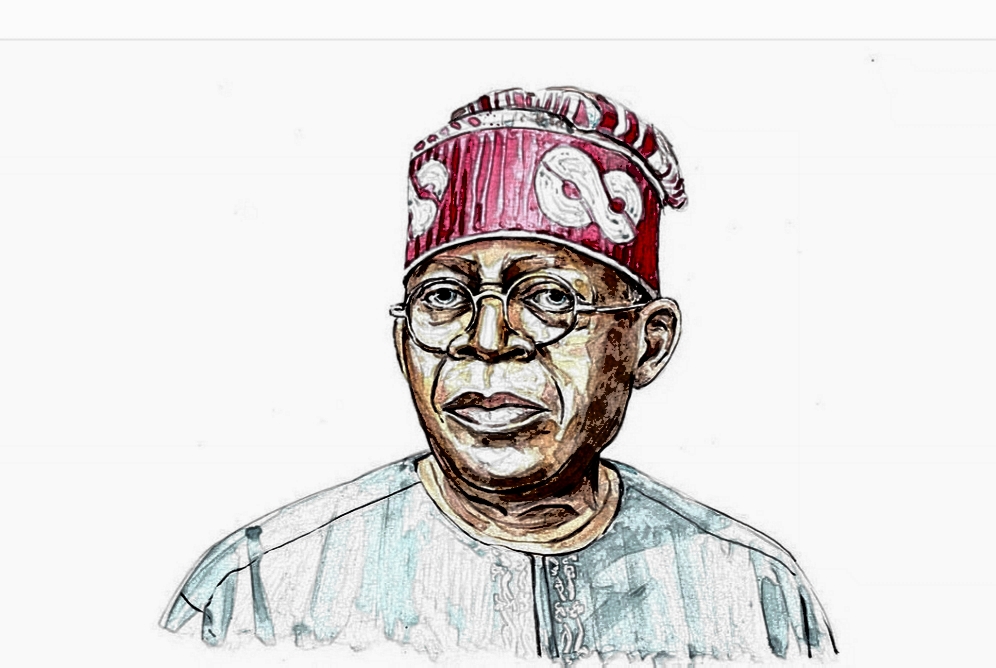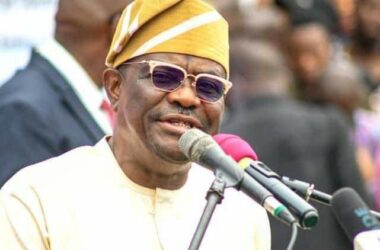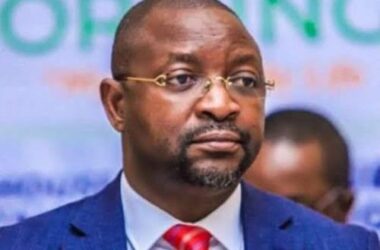Nigerian politics is known for its complex and often tumultuous nature, and few individuals have proven as capable of navigating its tempestuous waters as a former governor and presidential aspirant, Bola Ahmed Tinubu. Over the course of his involvement in Nigerian politics, Tinubu has become famous for his ability to thrive amid political chaos. Asiwaju Bola Ahmed Tinubu has faced several challenges throughout his political career, seeming to attract opposition easily to whatever he sets out to do, despite being a well-established power broker in the Nigerian political circle. If you put a pin on the timelines, you will see that BAT shows up frequently in the eye of the storm; therefore, his enduring presence as a power broker in the country’s political landscape demands close examination and analysis.
Long ago, during the interminable reign of the military in political governance, Asiwaju joined the group of people who loudly insisted on returning the country to democratic governance. Was he aware of the issues that would besiege that first attempt to become a senator of the federal republic of Nigeria? It isn’t very likely. What goes without doubt, however, is that he has never looked back, no matter the conflicts or roadblocks. Even currently, Asiwaju is busy leveraging his charisma and strategic alliances as a significant figure in Nigerian politics to achieve long-term success and influence in Nigeria’s political landscape, even as he sets his eyes firmly on Aso Rock.
It is interesting enough to note that he fought to ensure the toppling of military governance, and even more intriguing to note that he has had to fight for the achievements and laurels he has won while serving to uphold Nigeria’s democracy.
True to the concept of agonism in political philosophyㅡan idea that incorporates fighting and strategizing for what you want without backing downㅡTinubu has had his share of moments of political tussles, to execute plans, to win over the people and to keep himself away from courthouses or prison. Name a struggle or accusation, and you are likely to find Asiwaju’s name attached to it in one place or the other. The who and why fade in significance to the fact that Tinubu remains standing when the storm has spent itself. He remains standing and even goes up one or several levels in the end, and this has been the trend right from the beginning of his foray into politics. He is definitely in love with power, power play, and the progress that can be achieved by wielding state power. As he is quoted to have said by The Guardian (June 12, 2019), “In the realm of politics, the most fundamental truth that man has discovered is that power can be the handmaiden of progress and accelerated development, only if it flows from the will of the electorate as determined in regular, free, fair and credible elections.” Here, Tinubu’s push for credible elections is prefaced by his belief in holding power for the common good.
About three decades ago, Asiwaju Bola Ahmed Tinubu became involved in the pro-democracy movement that fought against the military dictatorship in Nigeria. He was a key player in the post-June 12, 1993 election struggle, an election in which he had sought and won the Lagos West constituency senatorial seat under the now-defunct Social Democratic Party (SDP) in 1992. He was already the Chairman of the Senate Committee on Banking, Finance, Appropriation, and Currency – a foremost principal committee of the Senate, but his senatorial life quickly turned into activism when the military government upturned the electoral process. However, Tinubu joined the movement to restore the mandate of Moshood Abiola, the winner of the June 12, 1993 presidential election, which the military government annulled. Tinubu’s role in the June 12 struggle exposed him to the deep work of surviving as the opposition, no matter how powerful or hostile the entity blocking the way. The tragedies and intrigues experienced between 1992 and 1998 will fill a book dedicated to the purpose; Tinubu himself suffered harassment, detention, and threats to his life before he went into a political asylum. His experience and activism, especially in collaboration with the National Democratic Coalition (NADECO), established him as a leading opposition figure in Nigerian politics and helped to lay the groundwork for his political career under full democracy.
Tinubu’s emergence as a power broker became evident when he played a key role in the formation of the opposition party, the Alliance for Democracy (AD), which won several governorship elections in the southwest region of Nigeria in the 1999 general elections. He became the Governor of Lagos State in 1999 and used his position to consolidate his political power and influence in the region. During his tenure as Governor, Tinubu implemented several policies and initiatives to improve the lives of Lagos State’s people, which helped to increase his popularity and influence in the country’s political landscape.
It’s often said that many of the infrastructural policies implemented afterward, are his brainchild; and even though, Tinubu scarcely alludes to that narrative when talking about his own achievements, it’s quite unlikely that there isn’t some truth to the rumor. Afterall, the man has shown an uncanny ability to select and sponsor some of the finest to steer the affairs of Nigeria’s commercial nerve centre, which may be proof of a development blueprint aimed at transforming Lagos into a megacity, which can only be achieved with continuity. It’s also no coincidence that Tinubu’s influence continued to grow after he left office as Governor of Lagos State in 2007, and became the National Leader of All Progressives Congress (APC) in 2013, following the coalition of the Action Congress of Nigeria (ACN), The Congress for Progressive Change (CPC), the All Nigeria Peoples Party (ANPP) a faction of All Progressives Grand Alliance (APGA) and another faction of the ruling People’s Democratic Party (PDP). Tinubu’s political skills and strategic acumen have been instrumental in the success of the APC, and by his political masterstroke, the party swelled from an almost mono-regional entity as the ACN to a mega party that upturned the 2015 election to victory at the presidential polls in 2015 and 2019, and securing the Aso Rock seat for the current Nigerian President, Muhammadu Buhari, and Vice-President Yemi Osinbajo. Tinubu’s greatest strength, apart from never giving up, is his ability to build political coalitions and strategic political maneuvering. This combination has made him a powerful political figure in Nigeria, leading him to his current journey to the office of the President.
Nigeria’s Fourth Republic began in 1999 and Tinubu’s career has grown with it; his eight-year tenure in that office is widely regarded as a model for good governance and effective leadership in Nigeria. During his time as Governor, Tinubu implemented several policies and initiatives aimed at improving the lives of the people of Lagos State, including investments in infrastructure, healthcare, education, and public safety. He also established a reputation for being a political strategist and a master of coalition building, which allowed him to build a strong political base and maintain his influence in the country’s political landscape.
He achieved all these while fighting off the opposition party’s (PDP) attempts to discredit him and get their party member into office. Rumour-mongering, disaffection-breeding and policies to impede good governance were some of the pitfalls Tinubu experienced in his eight years as governor. Tinubu won the 1999 election on the platform of the Alliance for Democracy (AD) party, but allegations of irregularities and fraud marred his victory. This led to a protracted legal battle, which ultimately resulted in Tinubu being declared the rightful winner of the election. Furthermore, in the face of allegations against him spanning corruption, fraud, tax evasion, and money laundering, Tinubu has consistently denied these allegations and, more importantly, these allegations have never been established in a court of law. For instance, the 2011 tribunal of the Code of Conduct Bureau dismissed the allegation against him that he operated foreign accounts while in office as Governor of Lagos State between 1999 and 2007.
One long-running battle that would have made a mess of his political ambitions as Governor was that of the Federal Government, as he was the only opposition governor in the opposition in Southwest. This tussle was especially pronounced in his second term in office, as he collided with the PDP-controlled Federal Government regularly, especially with his extra-constitutional creation of 37 more Local Council Development Areas (LCDA) for Lagos State. He maintained his stance that it was purely for administrative purposes and they would not be referred to as Local Government Areas, but the Olusegun Obasanjo-led Federal Government would have none of it.
Rather than give up on being able to govern well, consequential to the heat from Abuja, Tinubu focused on growing the state’s internal revenue and its judicious use until a Supreme Court judgment in his favour stated that the Federal Government should release the seized Lagos State Local Government funds years later. As of that isn’t enough, Tinubu has faced a number of political intrigues and betrayals from within his own party and political allies. For example, he fell out with his political mentors and Yoruba bigwigs, Chief Abraham Adesanya and Chief Ayo Adebanjo, and he has also had to contend with opposition from within the All Progressives Congress (APC) and other political parties.
After leaving office as Governor, Tinubu continued to play an influential role in Lagos and Nigerian politics, promoting continuity with visible results in how Lagos has had seasoned governors since he left office. Furthermore, Tinubu’s high intra-party activity earned him the street nickname of Lagos Landlord; and while the s4 is often used in the mocking sense by political opponents, it’s a vicarious testament to how widespread Tinubu’s political tentacles are in Lagos State. Apart from reforming his ever-widening political base through rebranding the party platforms he contested from, he successfully midwifed a merger of the ACN, CPC and ANPP into the APC—the All Progressives Congress—the party that ended PDP’s 16-year reign on the federal stool. He became the National Leader of the All Progressives Congress (APC), the ruling party in Nigeria, having won the 2015 and 2019 general elections at the federal level.
Long before the national electoral body, INEC, lifted the ban on political campaigning, there was anticipation and speculation about the possibility that Tinubu would run for the presidency on the ticket of the APC. The speculation became true when he did on January 10, 2022. In-between that day and June 8 2022, when Tinubu emerged as the winner of the APC presidential primaries, he experienced the drama, intrigue, and shocks that only a battle-tested warhorse like him can stand. And he fought back heartily; the internet is littered with stories and rumor’s of how much he has had to strategies, call in debts, consult, convince, travel, and pray to keep up with the progress he wants. He raced ahead of 13 other candidates to win the primary election, by 1,271 votes from party delegates.
Even as the steam of the 2023 election campaigns heats up, Tinubu’s political playbook seems to reflect an understanding that conflicts and struggles are a necessary part of politics and society, and that individuals and groups should engage in respectful and constructive forms of conflict in pursuit of their goals. He understands the importance of competition and contestation in politics and acts accordingly with civility and respect for those against whom he struggles. Tinubu is probably the most derided and “meme’d” out of all the presidential candidates, but he remains steadfast in his plans and propositions for the Nigeria of the future. The depth of his consultation was revealed once when Iyinoluwa Aboyeji, a nonpartisan technology professional, presented Candidate Tinubu’s plan for Nigeria’s tech industry in late 2022. At first, there was uproar as people assumed that Aboyeji’s presentation meant he was declaring that he was on Tinubu’s campaign team, then following more information, there was the realization that while many were busy looking for stones with which to pummel Tinubu’s ambition, he was busy speaking with the best talents in the country on how to move the country forward. This ability to focus on the core issues is exactly how Tinubu, by his influence, has ensured that Lagos State is unrivalled among the 36 states of Nigeria. Despite not having as many mineral resources as the other states, Lagos has managed to explore its potential to the fullest and achieve near total self-sufficiency, by looking inward, and maximizing internally generated revenue, as well as its immense labour market. Tinubu has emerged as a self-sufficient gem amidst other resource-filled, powerful, and big states in Nigeria.
The success of a political candidate depends on a wide range of factors, including campaign strategy, political alliances, public opinion, and many other unpredictable variables. As the 2023 politicking continues, it is evident that Tinubu is the most mentioned candidate all through the campaign season; his party, the APC, remains one of the most cohesive despite a keenly-contested primary election; his political structure and support from local strongmen in various states are intact; and he has considerable support in the North due to his alliance with other political forces and many are willing to work with him in the East. These are positives in his campaign, which was initially bogged down by allegations of impersonation, forgery, and corruption that have never scaled the courts. They may be ghosts of the hard work of political opponents – a move that’s not unheard of in Nigeria’s eventful political scene. However, just as before, these allegations have not taken root in a court of law.
Currently, some events may be speculated to work against Tinubu’s presidential ambition in Nigeria, one of which is the cash crunch experienced across the country over an economic policy that President Buhari continues to champion, which casts a foreboding shadow over the APC. This policy could erode Tinubu’s strong support base and harm his chances of winning the election. Nevertheless, for a man who is not new to emerging triumphant in adversity, it’s likely that Tinubu will weather this particular storm as well.
Asiwaju Bola Ahmed Tinubu continues to demonstrate political savvy, coupled with the determination that enables him to thrive in the complex and often chaotic Nigerian political environment. He has faced numerous challenges throughout his political career, either self-inflicted or external, but has been able to navigate them through a combination of political astuteness, tactical maneuvering, and strategic alliances. His ability to be diplomatic has also played a crucial role in his political success, as he has been able to build bridges across different factions and interest groups, a trait that will serve him well if he is pushed up to face the safety and security challenges in the country. No matter the result of the coming election, Tinubu’s political legacy as a political strategist, reformer, and leader will continue to shape the direction of Nigerian politics for many years to come.






